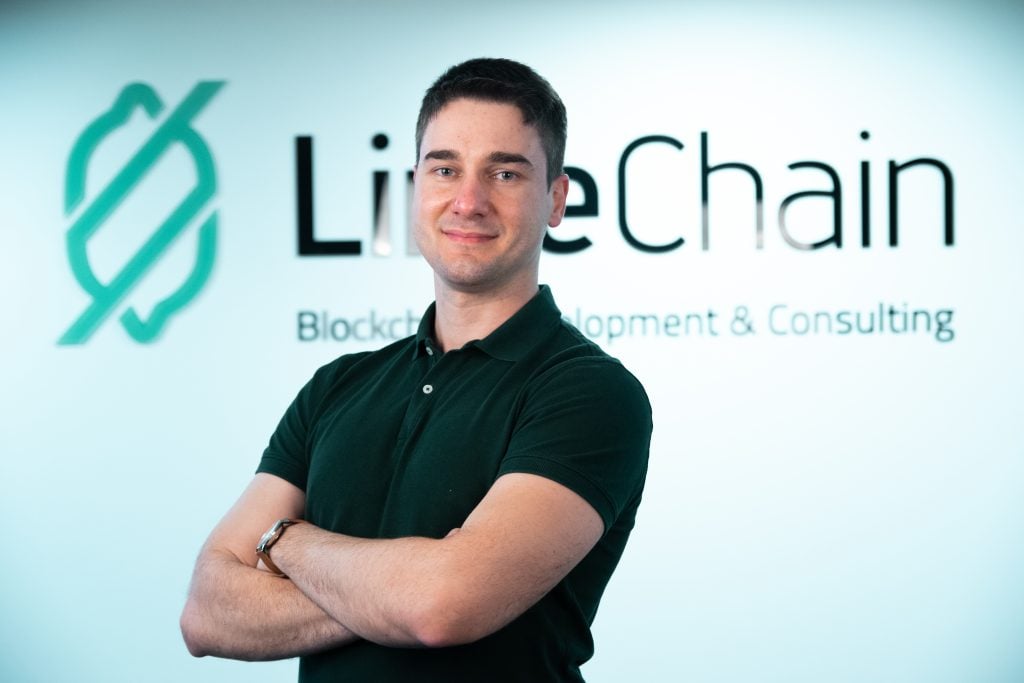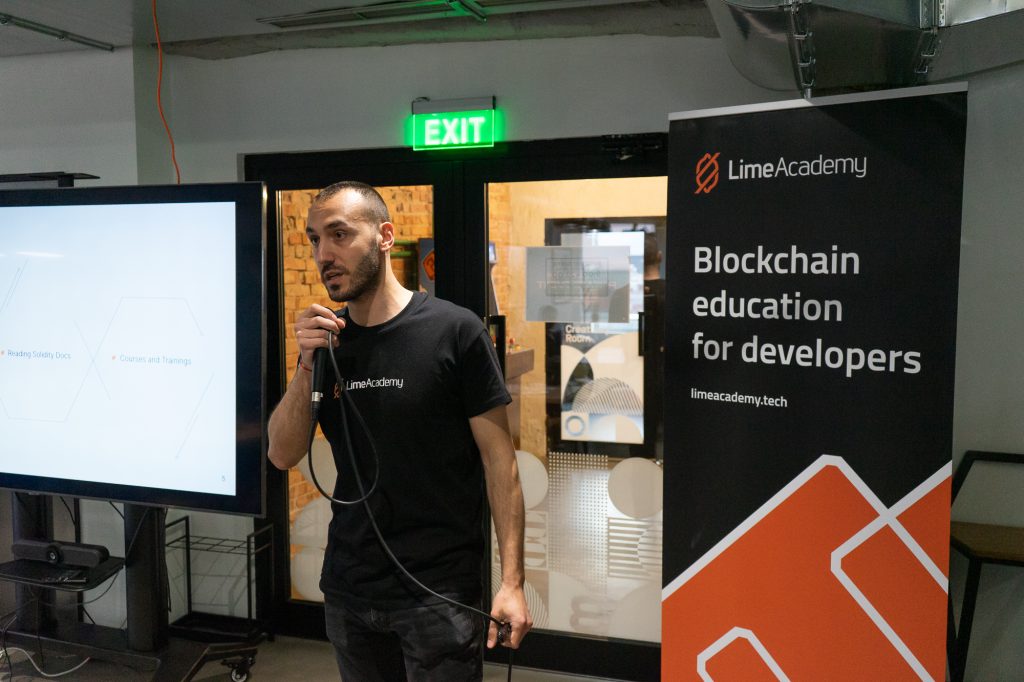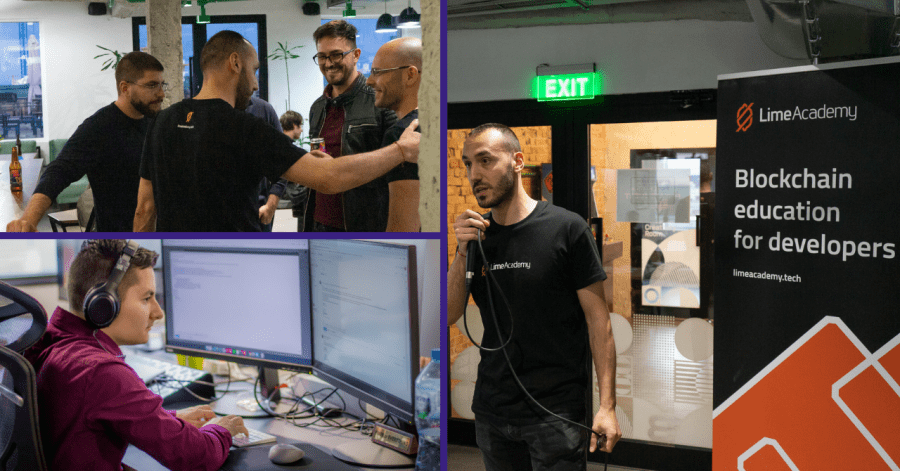Metaverse and Web3 are no longer just buzz words – they have become proven tools for the advancement of business models. All of that happened within a year. It started with the NFT craze and the public excitement around the Metaverse. Then, it got to the moment when big tech companies such as Facebook refocused their business models towards Web3, whole ministries in the Metaverse were created, and funds started to consider decentralized finance as an investment tool.
The expanding blockchain and Web3 space creates enticing opportunities for tech teams around the world. This leads to the emergence of novel blockchain-based and blockchain development businesses. “The pioneering blockchain companies will be the ones that pave the road and provide the newcomers with the know-how to innovate in the field,” Dimitar Ivanov, Head Of Business Development at the blockchain development company LimeChain, says.
Founded in 2017, by the tech professionals Nick Todorov, Chris Veselinov, George Spasov, and Vladislav Ivanov, LimeChain started with the vision to become an innovation-centric business, which is different from the traditional IT support companies in Bulgaria and differentiates with a culture that is fulfilling for the young local talents.
Being a company with international clients and partners, LimeChain has a broad overview of the state of the global blockchain ecosystem. In this interview with Dimitar Ivanov and Ognyan Chikov, Head of Mentors at LimeAcademy, The Recursive seeks to find out how the Bulgarian blockchain company tackles global blockchain challenges and opportunities.
The Recursive: What are some of the most pressing challenges in the blockchain space and what opportunities do these challenges open up?
Dimitar Ivanov: Blockchain and Web3 ecosystems underwent a rapid expansion in the last 18 months. We are seeing an influx of both institutional and Web3 investors. In addition, the overall maturity in both blockchain and Web3 verticals is accelerating. This led to an increased demand for adequate experts in the Web 3.0 field who are able to technically support all the blockchain teams, initiatives, and entrepreneurs in their decentralized endeavors. The emerging needs of businesses led to the need for increasingly challenging architectural and technological solutions. As a technical partner to our clients, we try to continuously innovate and create sustainable Web 3 solutions for their projects.

How is blockchain starting to penetrate into various sectors and industries? What are the trends enabling this to happen?
Like every new paradigm that fundamentally affects the way we are thinking, the penetration of blockchain across industries is a gradual and rather slow process. The early adopters and creators of new businesses that incorporate decentralized networks came from the startup ecosystems. This is because enterprises and companies in more well-established industries are a little bit more cautious about changes and the risks which are associated with them.
Some of the successful examples of how such risky business concepts created whole new industries are the DeFi, DAOs, and NFT verticals. They are in the process of being fully understood by the broader audience. New models and concepts are being constantly tested and launched in different industry verticals within Web 3.0. For example, Web 3 is about to become the next big thing in the gaming industry, while blockchain has an emerging use case in the enterprise industry with some of the use cases being supply chain, traceability, data validation, proof of ownership and authorship.
The trend that enables this to happen is that more and more businesses now understand how to incorporate decentralized networks in their business models in such a way that enables them to grow sustainability in the future.
LimeChian is a living example that developing world-class blockchain products from Bulgaria is possible. What’s your secret?
Nowadays, LimeChain is perceived by the broader audience as a global blockchain software development company. And since our establishment in 2017, the company has been positioned as a global expert in that area. We approach our projects and the projects of our clients not just from the perspective of a standard vendor. We perceive our role as a tech partner for that specific project. In our business, it is important to fully understand the clients’ needs and their business model. Only then can we help them align their business goals and business needs with our technical implementation.
We also understand that making mistakes in the blockchain and We3 space is very costly. For example, if you develop a smart contract or deploy something on the network, they are going to be on the Main Net, and then there is no going back. That is one of the main technical and business differentiators between Web 2.0 and Web 3.0.
Ognyan Chikov: Within the company, we don’t call ourselves colleagues, we call ourselves LimeChain family. We are always looking for new talents and always keeping an eye on the cutting edge of innovation and technology. We are also trying to give back to the local and global blockchain and tech community and organize different events, share knowledge, or participate in hackathons.
Our partners value that we are technology-agnostic. We are not afraid of experimenting with new Web3 technologies. This gives us an opportunity to propose to our clients the best architectural and technological approach based on their needs.
What are the various “branches'' in the Lime family? How and why did you decide to expand your portfolio of services?
Dimitar Ivanov: LimeChain is the foundation of all projects in the LimeChain family. It is the biggest company and the main focus is blockchain software development. Then, LimeLegal is a project that we started back in 2020 with the idea to become the legal partners of established companies and startups. In essence, we aim to help them navigate through the murky waters of Web3 compliance and legislation throughout different jurisdictions. LimeChain also has an R&D department, which we treat like a separate structure and expect to invest more into in the future. We are also anticipating to begin working on new projects like LimeAccounting to help our partners with Web3, crypto accounting, and financial advisory services. But one of the most interesting projects out there is LimeAcademy.
Ognqn Chikov: We did our first season of the blockchain academy in 2018. Back then, we did it together with a partner because we didn’t feel like we had enough experience to organize big events. Two years later, in 2020, we already had more than 100 blockchain projects behind our back and we decided to eventually launch our own academy. This is how LimeAcademy became a blockchain program for the experienced software developers who want to upskill and make a transition into the blockchain world. The Academy does not follow a lecture by lecture approach. Instead, our students receive a full package of educational materials and get matched with a mentor. This mentor, who is a developer in our company, is responsible for helping and teaching the students. Overall, the purpose of the Academy is to build savvy developers who are ready to go into the blockchain world.

What is special about LimeAcademy and LimeLegal? What additional value do they bring alongside LimeChain?
Ognqn Chikov: The need for blockchain developers is rapidly growing. We believe that the best approach to teach new talent is to put them in direct contact with the experts in the field. I remember the days when I started to get into the blockchain space – not only there weren’t enough materials, but also there weren’t many mentors who can help you with real-life use cases and problems. Now the students of the Academy are building up real-world projects for NFT marketplaces or token bridges. These projects are the outcome tasks that they need to complete in order to graduate. The graduates can then start a job either in LimeChain or at our partners, one of which is OpenZeppelin. In order to enter the Academy, you need to cover some basic knowledge. We provide materials for self-education and for creating an entry task. The candidates who develop the best entry task, get accepted. On average we take 25 to 30 people per batch and we are proud that 95% of the students graduate thanks to the support of the mentors.
Dimitar Ivanov: LimeLegal is a joint effort between LimeChain and Progressive Lawyers – a company of young, tech, and crypto-savvy advisers in Sofia, Bulgaria, with whom we teamed up back in 2020. We observed that many of the Web3 startups are founded by entrepreneurs with a tech or business background. They need someone to help them obtain the necessary licenses, advise them when their business models involve certain digital assets under license regimes within different jurisdictions. So we saw a native opportunity to expand and create this joint venture company called LimeLegal. We provide temporary CEO and compliance officers, we draft documentation, do research and many more. Essentially, just a couple of years ago, the standards in this field were non-existent, and now LimeLegal is starting to establish them.
How does LimeChain solve global problems and takes on major opportunities in the blockchain world?
Dimitar Ivanov: Blockchain, or as we call it now web3, is mostly a global business as we can have multiple industry sections. For example, we can have observations on the blockchain networks and their core protocols, tools, and scaling solutions as part of the infrastructure level. On the other hand, we have distributed applications (dApps) that provide the actual user interfaces, user experience, and interactions with each particular product developed to work with one or more networks.
Fortunately, nowadays, we have quite a large number of individuals and companies across many web3 ecosystems. Not only that, the communities are bigger but also laser-focused on quality, sustainability, growth, and vision for the future.
At any given moment in the past year, we were simultaneously working on around 15 to 20 projects.
Even though there are not many companies with similar profiles like ours in the regional blockchain space, the fact that the technology is so new levels the playing field. This makes us believe that any new blockchain company from the SEE region can create products with global impact. Just like LimeChain does.








